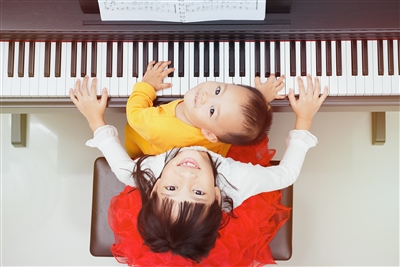The best instruments for a child`s musical development

Humans are naturally musical, with all cultures using music for enjoyment and relaxation, while also making use of it ceremonially, in birthdays and weddings, military marches and funerals. Just as it`s never too late to start learning an instrument, its also never too early to expose children to music. There is strong evidence that babies are responsive to music even whilst they are in the womb, and certainly from the moment of their birth they are extremely receptive to the tunes they hear. Growing up in a musical household, it`s natural that a child will develop in that direction. Interest is really more important that talent at this age, with all children naturally possessing a great capacity for learning during their early years. If Mozart`s father hadn`t been a composer and conductor, and he didn`t have an older sister who was a musician, it`s unlikely he would have become the famous composer we revere to this day.
Babies will sing without any prompting or training, and you may want them to develop their skills on another instrument - but which one should you choose? The list below may give some helpful pointers to parents wanting to encourage their child`s musical talents.
Drum (age 1 - 3)
This is the perfect instrument for the youngest of children, whose fingers and hands are too small to press the keys on a piano, or the strings on a violin. A drum is a versatile instrument, And though it lacks the facility to produce a range of pitches, the child will be able to generate different rhythms, and they should be encouraged to keep time with some of their favourite songs. Shakers or maracas are another good percussion instrument - just be sure you are ready for some noisy and enthusiastic performances!
Xylophone (age 2 - 4)
These are instruments every child will be instinctively drawn to - anything you can bash with a stick to make music is certainly going to be fun! Some Xylophones just present three or four notes, but others will lay out a whole major scale of seven tones. With this simple set up a child will be able to imitate or create many melodies, so a Xylophone is actually a very capable instrument. More advanced Xylophones may have 12 or more notes, allowing the little performer to sound out the accidentals (sharps and flats), and perform more complex melodies.
Ukulele (age 6)
To most people the ukulele is just a small guitar, but it really is the ideal instrument for a young child. The thin neck and light strings make it easy for small hands to hold, and they will soon be strumming away to their favourite songs! The child will quickly learn chord formations, introducing the world of harmony to the young musician. A proficiency in the ukulele will be a great benefit for later on, if the little musician wants to learn the guitar - but thats not to say that the ukulele is any kind of intermediary instrument! Many famous composers have written concertos and important solo works for it, and there`s even a Ukulele Orchestra of Great Britain!
Piano (age 6+)
The piano is an extremely versatile instrument: it can be percussive, and capable of building large and complex musical structures; and it can also produce an etherial legato accompaniment, over which hovers a bel canto melodic line. The name piano is a contracted form of pianoforte, the eighteenth century progenitor of the instrument, which was literally called a `soft loud`, to distinguish it from harpsichord, whose plucked strings could only sound at one volume. The instrument may be daunting for beginners, but the earlier the child begins the more likely they are to become the next Vladimir Horowitz or Glenn Gould!
Though most piano teachers would entreat parents to purchase nothing but a real piano with full sized keys, a young child may find it easier to start their lessons on a small electronic keyboard. Most of these keyboards will be compact, and certainly more affordable than a full sized upright piano. The narrower keys will be more congenial to smaller hands, and there`s no danger of the instrument going out of tune. If they have any aptitude for the instrument they should not spend too much time with this diminutive version though - perhaps no more than a year or two - before upgrading to the full sized piano.

 Add a Comment
Add a Comment